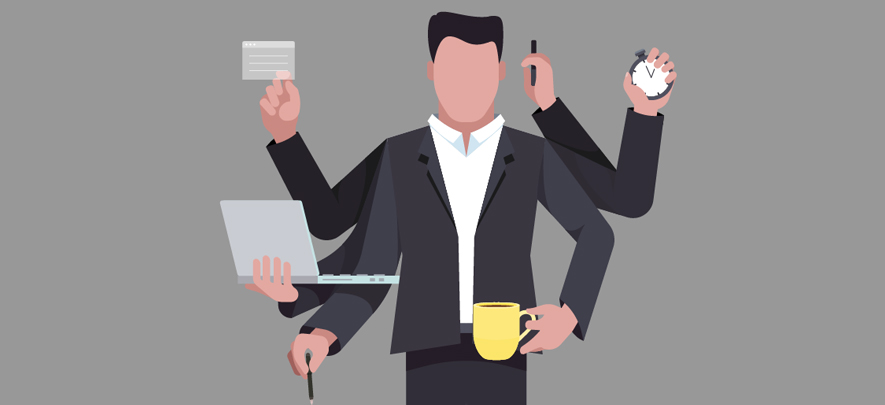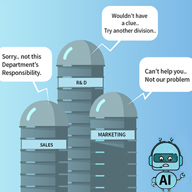Productivity in the age of information overload

Learning & Development
292 week ago — 9 min read
Background: While access to vast information at our fingertips is a boon of modern society, the drawback is that this information overload can negatively impact productivity, creativity and even comprehension. The internet has been around for just over two decades and it’s impact on our lives has become pervasive very quickly. Every 60 seconds 160 million emails are sent, 694,445 Google searches are done, 600 videos are uploaded on Youtube and so on. The numbers are staggering, and the question is how do we prevent ourselves from being overwhelmed and distracted by the abundant information available to us. In his previous article Kendrick De Figuieredo Melo explained the negative impact of silo mentality on AI adoption. Here he explores how one can optimise productivity in the midst of this information explosion.
“There seems to be some perverse human characteristic that likes to make easy things difficult.” — Warren Buffett
Information overload describes an excess of information available to a person aiming to complete a task or make a decision. Information overload occurs when the amount of input to a system exceeds its processing capacity. Decision makers have fairly limited cognitive processing capacity. Consequently, when information overload occurs, it is likely that a reduction in decision quality will occur. The concept of information overload has been around for longer than the phrase and even in the 3rd (or possibly 4th) century BCE the writer of Ecclesiastes 12:12 was complaining that “of making books there is no end.''
Information overload describes an excess of information available to a person aiming to complete a task or make a decision. Information overload occurs when the amount of input to a system exceeds its processing capacity.
Throughout history, there have been complaints about information overload, particularly during the Renaissance and the Industrial Revolution periods. However, the dawn of the information age and access to powerful and low-cost data collection on an automated basis has brought us more information than at any other point in history. Managing information in daily life is no longer restricted to a wealthy elite but is a problem which everyone faces. Social media, e-mail, webpages, mobile apps, TV etc. all spill data into our lives daily.
Also read: How to achieve ‘flow state’ at work to enhance productivity & minimise delays
Causes of information overload
- Huge volume of new information constantly being produced for consumption
- Competition within content creation giving birth to the norm of quantity over quality
- Existing information being replicated on different platforms
- The constant increase in the number of channels the information can be broadcasted on radio, TV, the internet, etc
- The ever-increasing amount of historical data present with us
- Massive volume of conflicted, inaccurate and contradictory information available with us
- Lack of clear structure in the cluster of information
Negative impact of information overload
There is a lot that can go wrong due to information overload when the user isn’t happy with the consumption of said content. Some of the negative impacts of information overload are:
- Significant decline in memory
- Reduced information retention ability
- Stress and burnout from the frequency and volume of the information received
- Lesser uptake of new and relevant information
- Shorter attention span and reduced focus time
- Increase in depression and anxiety due to sheltered living.
- Lesser real-world conversations and connections.
- High absent-mindedness and social distractions.
Now as we know of the negative impacts that information overload causes, we need to learn how to combat these. We should not let it affect our productivity because as we know, “Getting information from the internet is like taking a drink from a fire hydrant.” - Mitch Kapor
Information overload is an actual phenomenon which stops us from making decisions or act because we feel we have too much information to consume. There are some simple tips to minimize the impact of information overload on ourselves. Following these tips can significantly help reduce (though it will never completely eliminate) the information overload that we have to handle.
Also read: 3 hacks to skyrocket your productivity
Tips to combat information overload
Limit your information intake
Productivity is hindered whenever a person is way too involved in the information available to them and most of it is not relevant either. To maximise productivity, one has to learn to skip information. This obviously does not mean avoiding important stuff, but just the understanding that you can’t absorb every drop of information available and not feel guilty for avoiding it. Reducing your incoming content can help you register, retain and react to information more constructively. For instance, you could limit your streaming channels. Do you have multiple news sources that are providing the same information? Instead of consuming content from different sources, identify a few channels to access the information. Moreover, you must prioritise the type of content you want to regularly access by means of identifying topics. This helps you to focus on topics of your interest without getting bogged down by a barrage of different content.
Set aside a specific time for checking content
Instead of constantly accessing news and other information, set aside a specific time to check such sources so that it does not interfere with your work flow.
Monitor your time on social media
Most social media channels are designed in a way to lure you to mindlessly keep viewing your timeline, posts or videos. This can be a major time-consumer, so be mindful of how frequently you access different social media channels or set aside a specific amount of time for the same.
Take a brain dump
Help your brain to process information by making lists and notes. The brain takes time to assimilate information, so assist this process by streamlining it. Writing down your ideas and understanding prevents the brain from getting muddled or confused.
Prioritise your tasks and information stream
Sounds simple enough, but sometimes in a bid to do everything at once, we compromise on quality, productivity and risk feeling overwhelmed. Focus one task at a time and relish the joy of completing tasks and tick them off your to-do-list.
In order to not let information overload affect productivity, you should know the fact that incoming information need not be tackled immediately as it comes. Instead, it can be queued and looked at in free time. Information needs to be filtered and delegated properly to improve efficiency.
Reduce distraction of notifications
The smartphone has transformed the way we communicate and consume information. But it also acts as a compelling force to constantly check for new emails, messages or other notifications. This acts as a huge deterrent to concentrating on a particular task or assignment. Switch off your mobile notifications and resist the urge to check for incoming message or mails all the time. This can significantly bolster productivity.
Clean your desk
Even though most of the information overload seems to come electronically, we may add information overload to our environment in other ways as well. For instance, a cluttered desk, with all sorts of papers, books, devices, stationery, or even food, may not be conducive for focus thinking. So, tidy up! Minimize clutter to maximise your productivity.
Everyone’s way of how they perceive a piece of information is different. Some may ignore it straightaway and some might overthink and let it mess with them. Share with us your tips for handling a surfeit of information.
Also read: Declutter your business the Marie Kondo way
To explore business opportunities, link with me by clicking on the 'Invite' button on my eBiz Card.
Disclaimer: The views and opinions expressed in this article are those of the author and do not necessarily reflect the views, official policy or position of GlobalLinker.
Posted by
Kendrick Bradney De Figueiredo MeloDigital Transformation and Social Collaboration for Businesses. Simple and Agile Digital Workplace. A seamless way to market, sell, support and manage your organization.
View Kendrick 's profile
Other articles written by Kendrick De Figueiredo Melo
SaaS Platform - A smart way to run & grow business
294 week ago
Most read this week
Trending
Ecommerce 26 Mar 2025












Comments
Share this content
Please login or Register to join the discussion